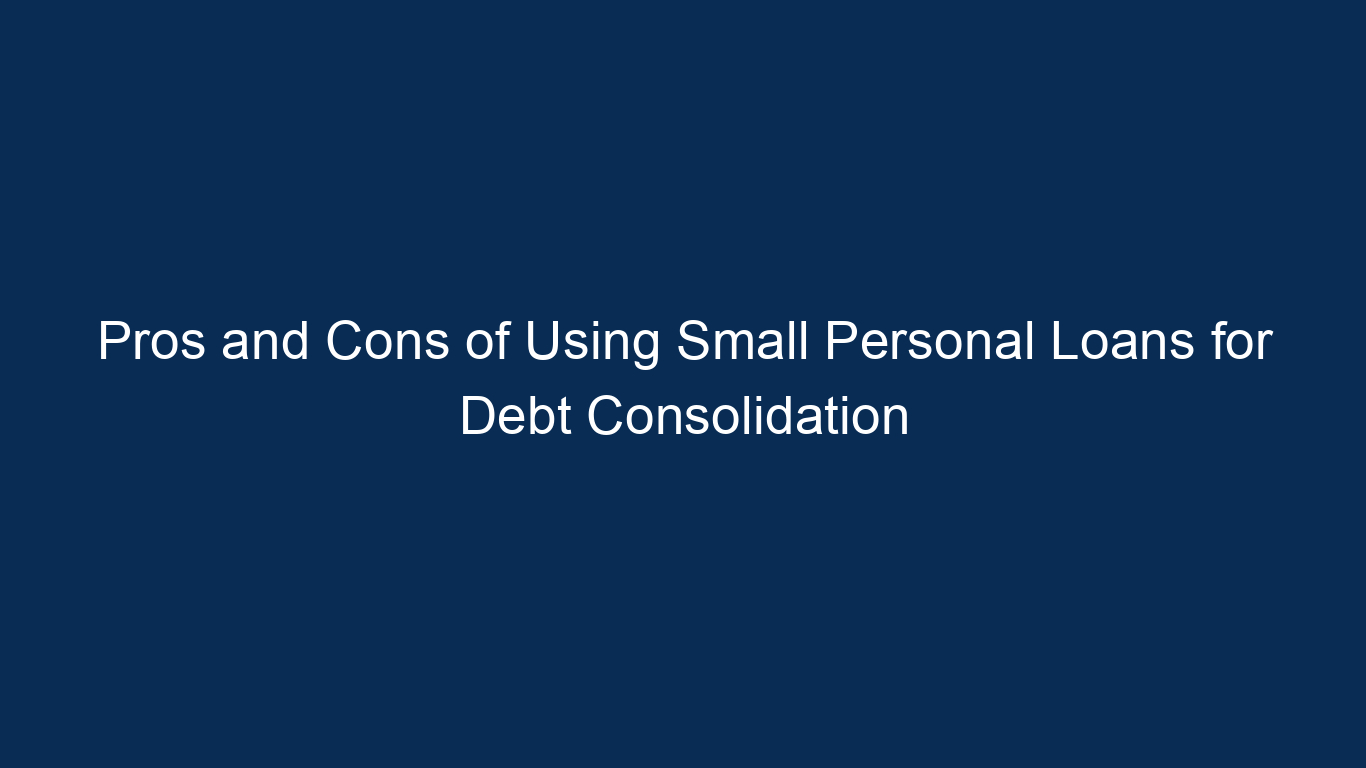Debt consolidation is a popular strategy used by individuals to manage and reduce their debt burden. It involves combining multiple debts into a single loan, typically with a lower interest rate and more manageable monthly payments. While there are several options available for debt consolidation, one increasingly popular choice is using small personal loans for this purpose. Small personal loans offer borrowers the flexibility and convenience of consolidating their debts into one manageable monthly payment. However, like any financial decision, there are pros and cons associated with using small personal loans for debt consolidation. This article will explore the advantages and disadvantages of this approach, helping individuals make an informed decision when considering this debt management strategy.
Table of Contents
- “Exploring the Pros and Cons of Using Small Personal Loans for Debt Consolidation: Is it Worth it?”
- “Small Personal Loans for Debt Consolidation: A Comprehensive Look at the Benefits and Drawbacks”
- “Pros and Cons of Utilizing Small Personal Loans to Consolidate Debt: Making an Informed Decision”
- “Understanding the Advantages and Disadvantages of Small Personal Loans for Debt Consolidation: What to Consider Before Taking the Leap”
“Exploring the Pros and Cons of Using Small Personal Loans for Debt Consolidation: Is it Worth it?”
Debt consolidation is a popular strategy for individuals looking to manage their debts and improve their financial situation. One option that many consider is using small personal loans to consolidate their debts. While this approach can offer several benefits, it also has its drawbacks. In this article, we will explore the pros and cons of using small personal loans for debt consolidation, helping you decide if it is worth pursuing.
Pros:
- Simplified repayment: One of the main advantages of using small personal loans for debt consolidation is that it simplifies your repayment process. Instead of keeping track of multiple debts with different due dates and interest rates, you only need to manage a single loan. This can make it easier to stay organized and reduce the chances of missing payments.
- Lower interest rates: Personal loans often have lower interest rates compared to credit card debts or other high-interest loans. By consolidating your debts into a personal loan, you may be able to secure a lower interest rate, reducing the overall cost of your debt. This can save you money in the long run and help you pay off your debts faster.
- Fixed repayment schedule: Personal loans typically come with a fixed repayment schedule, which means you know exactly how much you need to pay each month and for how long. This predictability can help you budget more effectively and plan your finances accordingly.
- Improved credit score: Consistently making on-time payments towards your personal loan can have a positive impact on your credit score. By consolidating your debts and managing them responsibly, you can demonstrate your financial discipline and potentially increase your creditworthiness over time.
Cons:
- Additional debt: While consolidating your debts can simplify your repayment process, it does not eliminate your debts. Instead, you are taking on a new loan to pay off the existing ones. This means you are still in debt, and if you continue to accumulate more debt, you may find yourself in an even more challenging financial situation.
- Potential for higher costs: While personal loans generally offer lower interest rates, this may not always be the case. Depending on your creditworthiness and the terms of the loan, you may end up with a higher interest rate than what you currently have. Additionally, some lenders may charge origination fees or other costs that can increase the overall expense of the consolidation loan.
- Risk of default: If you fail to make payments on your consolidation loan, you risk defaulting on the loan and damaging your credit score. This can further complicate your financial situation and make it harder to secure future loans or credit.
- Limited eligibility: Not everyone may qualify for a small personal loan for debt consolidation. Lenders consider various factors such as credit score, income, and debt-to-income ratio when assessing loan applications. If you have a poor credit history or high levels of existing debt, you may struggle to secure a personal loan with favorable terms.
In conclusion, using small personal loans for debt consolidation can be a viable option for some individuals. It offers simplified repayment, potential cost savings, and the opportunity to improve credit scores. However, it is crucial to consider the potential downsides, including the risk of additional debt, higher costs, potential default, and limited eligibility. Before pursuing this approach, it is advisable to carefully evaluate your financial situation and seek professional advice if necessary.
“Small Personal Loans for Debt Consolidation: A Comprehensive Look at the Benefits and Drawbacks”
Debt consolidation is a popular method for managing multiple debts and streamlining your financial obligations into a single, more manageable payment. One option for achieving this is through small personal loans specifically designed for debt consolidation. In this article, we will provide a comprehensive look at the benefits and drawbacks of utilizing small personal loans for this purpose.
Benefits of Small Personal Loans for Debt Consolidation:
- Simplified Repayment: One of the greatest advantages of using a small personal loan for debt consolidation is the convenience of a single, fixed monthly payment. Instead of juggling multiple due dates and varying interest rates, you can consolidate all your debts into one loan with a consistent payment amount, making it easier to track and manage your finances.
- Lower Interest Rates: Small personal loans often come with lower interest rates compared to credit cards or other high-interest debts. By consolidating your debts into a personal loan, you can potentially reduce the overall interest you’ll pay, saving you money in the long run.
- Improved Credit Score: If you have multiple debts with high credit utilization, consolidating them into a single personal loan can positively impact your credit score. By paying off these debts and maintaining timely payments on the loan, you can demonstrate responsible financial behavior, which can boost your creditworthiness.
- Faster Debt Repayment: Small personal loans typically have fixed repayment terms, which means you’ll have a specific timeframe for paying off your consolidated debt. This can provide motivation to stick to a disciplined repayment plan and potentially help you become debt-free sooner.
Drawbacks of Small Personal Loans for Debt Consolidation:
- Eligibility Requirements: Qualifying for a small personal loan may require a good credit score and a stable income. If your credit history is less than stellar or you have a fluctuating income, you may find it challenging to secure a loan with favorable terms or even get approved at all.
- Additional Fees: Some lenders may charge origination fees or other upfront costs for obtaining a small personal loan. It’s essential to carefully review the terms and conditions to understand all associated fees and ensure that they don’t outweigh the potential benefits of consolidating your debts.
- Temptation to Accumulate New Debt: Once you consolidate your debts, it may be tempting to use your newly available credit limit on credit cards or other financing options. This can lead to a cycle of accumulating additional debt, further complicating your financial situation.
- Potential Collateral Requirement: Depending on your creditworthiness and the lender’s policies, you may be required to provide collateral, such as a car or property, to secure a small personal loan. If you default on the loan, you risk losing the collateral, which can have severe financial consequences.
In conclusion, small personal loans can be an effective tool for debt consolidation, offering simplified repayment, lower interest rates, credit score improvement, and faster debt repayment. However, it’s crucial to consider the potential drawbacks, such as eligibility requirements, additional fees, temptation to accumulate new debt, and collateral requirements. Before deciding on a small personal loan for debt consolidation, carefully evaluate your financial situation and weigh the pros and cons to make an informed decision.
“Pros and Cons of Utilizing Small Personal Loans to Consolidate Debt: Making an Informed Decision”
Consolidating debt can be a viable solution for individuals who are facing multiple loan repayments and struggling to keep up with their financial obligations. One option to consider is utilizing small personal loans to consolidate debt. However, before making a decision, it is essential to weigh the pros and cons of this approach. This article provides an informative analysis of the advantages and disadvantages of using small personal loans for debt consolidation, aiming to help readers make an informed decision. The writing style is informative, providing factual information, while the writing tone is formal, maintaining a professional and objective approach.
One of the primary advantages of utilizing small personal loans for debt consolidation is the potential for lower interest rates. Personal loans, especially those with good credit scores, often have lower interest rates compared to credit cards or other high-interest loans. By consolidating multiple debts into a single personal loan, borrowers may be able to secure a lower interest rate, ultimately reducing the overall cost of debt repayment.
Another benefit of using small personal loans for debt consolidation is the simplicity and convenience it offers. Instead of juggling multiple loan payments and due dates, borrowers can streamline their financial obligations by combining them into a single loan. This not only reduces the chances of missing payments but also provides peace of mind by simplifying the repayment process.
Furthermore, small personal loans for debt consolidation can potentially improve credit scores. When borrowers make timely payments on their consolidated loan, it demonstrates responsible financial behavior, which can positively impact their credit history. With better credit scores, individuals may have improved access to future credit opportunities and lower interest rates.
However, it is crucial to consider the potential downsides of utilizing small personal loans for debt consolidation. Firstly, borrowers must be cautious about extending the loan term. While consolidating debt can make monthly payments more manageable, extending the repayment period may result in paying more interest over time. Therefore, it is essential to carefully assess the total cost of the loan, including interest and fees, before committing to consolidation.
Additionally, obtaining a small personal loan may require a good credit score or collateral. Individuals with poor credit history may face challenges in securing favorable loan terms, including higher interest rates or stricter repayment terms. It is crucial to evaluate the eligibility criteria of personal loans and assess one’s creditworthiness before applying.
Lastly, consolidating debt through small personal loans does not address the root cause of financial difficulties. It is essential to identify and address the underlying spending habits or financial mismanagement that led to the accumulation of debt. Without addressing these issues, individuals may continue to face financial challenges even after consolidating their debts.
In conclusion, utilizing small personal loans for debt consolidation can offer several advantages, including lower interest rates, simplicity, and potential credit score improvement. However, it is essential to carefully consider the potential drawbacks, such as extended loan terms and eligibility requirements. Additionally, individuals must address the root cause of their financial difficulties to prevent future debt accumulation. By weighing the pros and cons, individuals can make an informed decision about whether small personal loans are the right choice for their debt consolidation needs.
“Understanding the Advantages and Disadvantages of Small Personal Loans for Debt Consolidation: What to Consider Before Taking the Leap”
Debt consolidation is a common financial strategy used to manage multiple debts by combining them into a single loan. One option for debt consolidation is taking out a small personal loan. Before taking the leap and applying for a small personal loan for debt consolidation, it is important to understand the advantages and disadvantages associated with this approach. This article aims to provide an informative and formal analysis of these factors to help individuals make an informed decision.
Advantages of Small Personal Loans for Debt Consolidation:
- Simplified Debt Management: One of the main advantages of using a small personal loan for debt consolidation is the simplification of debt management. Instead of dealing with multiple creditors, borrowers only have to make a single monthly payment towards their loan. This can reduce confusion and make it easier to stay organized.
- Potentially Lower Interest Rates: If borrowers have multiple debts with high interest rates, consolidating them into a small personal loan could potentially result in a lower overall interest rate. This can save money in the long run, as lower interest rates mean less money paid towards interest charges.
- Fixed Repayment Terms: Small personal loans typically come with fixed repayment terms, meaning borrowers know exactly how long it will take to pay off the loan. This can provide a structured plan for debt repayment and help individuals stay on track with their financial goals.
Disadvantages of Small Personal Loans for Debt Consolidation:
- Potential for Higher Interest Rates: While small personal loans can offer lower interest rates, it is important to note that this is not always the case. Depending on an individual’s creditworthiness and financial situation, the interest rate on a small personal loan may be higher than the rates on their existing debts. It is crucial to carefully compare interest rates before deciding on a loan.
- Fees and Charges: Some lenders may charge origination fees or other upfront costs when issuing a small personal loan. These fees can add to the total cost of borrowing and should be taken into consideration when evaluating the affordability of the loan.
- Risk of Secured Loans: In some cases, borrowers may need to secure a small personal loan with collateral, such as their home or car. This means that if they fail to make payments, they risk losing their assets. It is important to carefully assess the risk associated with secured loans before proceeding.
In conclusion, small personal loans can be an effective tool for debt consolidation, but it is crucial to consider the advantages and disadvantages before taking the leap. Simplified debt management, potentially lower interest rates, and fixed repayment terms are some of the advantages that borrowers may benefit from. However, higher interest rates, fees and charges, and the risk of secured loans are important factors that should be carefully evaluated. By understanding these factors and conducting thorough research, individuals can make an informed decision when considering small personal loans for debt consolidation.
In conclusion, using small personal loans for debt consolidation has its pros and cons. On the positive side, it can simplify your finances by combining multiple debts into a single loan with a lower interest rate. This can help you save money on interest payments and potentially pay off your debts faster. Additionally, small personal loans are often more accessible and require less stringent eligibility criteria compared to other forms of debt consolidation, such as home equity loans.
However, there are also some drawbacks to consider. Small personal loans may come with higher interest rates compared to secured loans, which can increase the total cost of borrowing. Furthermore, taking on additional debt to pay off existing debts can be a risky strategy if you do not address the underlying causes of your debt. It is important to have a solid plan in place to manage your finances and avoid falling into the cycle of accumulating more debt.
Ultimately, the decision to use small personal loans for debt consolidation should be based on your specific financial situation and goals. It is wise to carefully evaluate the pros and cons, consider alternative options, and seek professional advice if needed, to make an informed decision that aligns with your long-term financial well-being.






